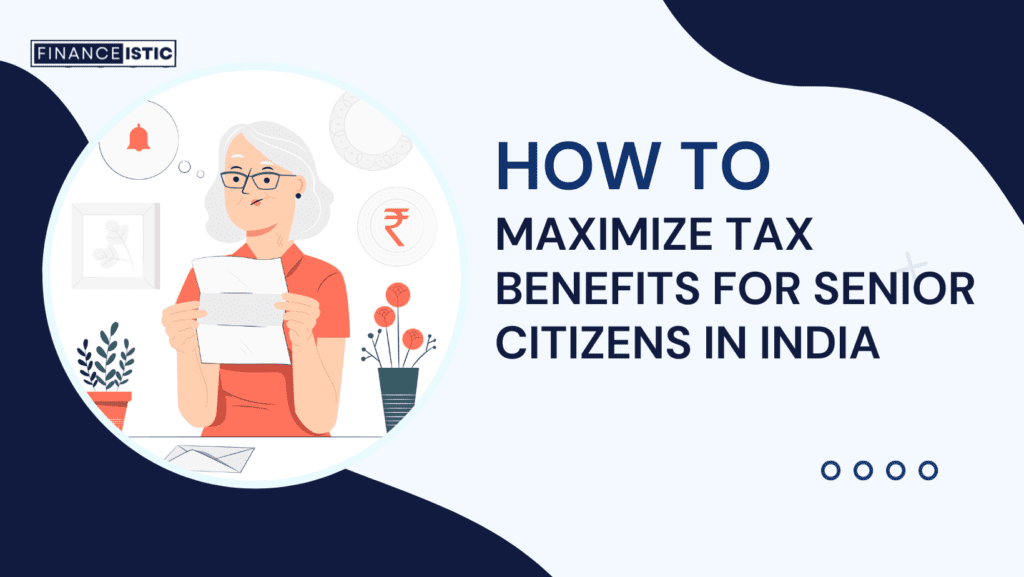As people enter their retirement years, it is important to manage the money smartly including dealing with taxes. In India, individual aged 60 and above is called senior citizens and can enjoy several tax benefits. These benefits can reduce tax liability and improve the financial security during retirement. In this article we will explore How to maximize tax benefits for senior citizens in India in 2024 under the Income Tax Act, 1961.

Table of Contents
Who is a Senior Citizen in India?
According to the Income Tax Act, 1961, if you are 60 years or older but less than 80 at any time during the relevant financial year, you are a senior citizen. If you are 80 or older at any time during the financial year, you are a super senior citizen for tax purposes.
The CBDT clarified in circular No. 28/2016 about determining the age of a taxpayer for tax purposes. It stated that if you are born on April 1, then your age for tax purposes is considered as of March 31, the day before your birthday. So whether you qualify as a senior or super senior citizen is determined based on this rule.
How to maximize tax benefits for senior citizens in India
1. Higher Basic Exemption Limit
Senior citizens and super senior citizens can enjoy the higher basic exemption limits compared to other taxpayers. For the financial year 2023-24, senior citizens get an exemption up to ₹3 lakh, while super senior citizens get an exemption up to ₹5 lakh. This means they do not need to pay tax on income below these thresholds. However if they choose the concessional tax regime, the exemption limit is ₹3 lakh for all taxpayers regardless of age.
2. Higher Deduction for Interest Income
Senior citizens can get a higher deduction on interest income up to ₹50,000 u/s 80TTB as compared to the ₹10,000 deduction available to other taxpayer u/s 80TTA. They can claim this deduction for interest earned from savings accounts, fixed deposits and recurring deposits with banks, co-operative banks and post offices. Senior citizens have a wider scope whereas other taxpayers can only claim this deduction for savings interest. This deduction helps them maximize returns on their savings and investments.
3. Benefit Under Senior Citizen Savings Scheme
- To get benefit from this scheme, senior citizens need to deposit a minimum of ₹1,000 and a maximum of ₹30,00,000.
- The Tenure is 5 years initially but can be extended for another 3 years after maturity.
- Deposits made in this scheme are eligible for tax deduction up to a maximum of ₹1.5 lakh u/s 80C of the Income Tax Act.
4. Higher deduction for Mediclaim Premium and Medical Expenditure
- Senior citizens can claim up to ₹50,000 for Mediclaim premiums while others can claim only up to Rs. 25,000.
- Additionally, within this ₹50,000 limit, they can claim up to ₹5,000 for preventive health check-ups.
- Senior citizens above 60 years who are not covered by health insurance can also claim up to ₹50,000 for medical expenses.
5. Higher Deduction for Medical Expenditure for Specified Diseases
- Senior citizens can claim up to ₹1,00,000 for medical treatment of specified diseases while others can only claim up to ₹40,000.
- This deduction is applicable for expenses incurred on treatments like neurological diseases, malignant cancers and other specified diseases.
- If the senior citizen receives any insurance claim for these diseases, the claimed amount will be subtracted from the deduction amount under this section.
6. Relief from Payment of Advance Tax
- Normally anyone with a tax liability of ₹10,000 or more for the year must pay advance tax.
- However if you are a resident senior citizen and do not earn income from business or profession, you are exempt from this rule.
7. Relief from Deduction of Tax Deducted at Source (TDS)
- If you are a resident senior citizen and expect no tax liability for the year, you can submit Form 15H to your deductor.
- This exempts you from TDS on certain specified incomes.
- It is best to submit this form at the start of the financial year to prevent the unnecessary deductions and ensure your funds are not stuck anywhere.
8. Exemption from Filing of ITR
- They should be resident taxpayers.
- They only earn pension and interest income from the same bank where they receive their pension.
- They have submitted a declaration to their bank and the bank has deducted tax accordingly.
- Banks will handle the tax deductions for senior citizens above 75 considering their deductions and rebates. Once the bank deducts tax for them, they will not need to file income tax returns.
9. Availability of Offline Return Filing Facility
Super senior citizens can file their income tax returns in paper form at their local tax office if they are using ITR 1 (Sahaj) or ITR 4 (Sugam).
But this option is only for senior citizens who are “resident and ordinary resident for tax purposes”. If you are a senior citizen with a residential status of “Non-resident” or “Resident but not Ordinary Resident,” you will not be eligible for this benefit.
Conclusion
In conclusion, knowing “how to maximize tax benefits for senior citizens in India” is key to maximizing their finances. By taking the advantage of higher exemption limits, medical expense deductions and other provisions, senior citizens can reduce their tax burden. Understanding How to maximize tax benefits for senior citizens in India can lead to a more secure retirement. So be sure to explore and utilize these opportunities to optimize tax benefits for senior citizens in India in 2024.
Disclaimer: Please note that the information provided on this website is for informational purposes only. It is important to seek legal advice from a expert in your jurisdiction.
Frequently Asked Questions (FAQ)
If individual completes his age of 80 at any time during the financial year, he becomes a super senior citizen for tax purposes.